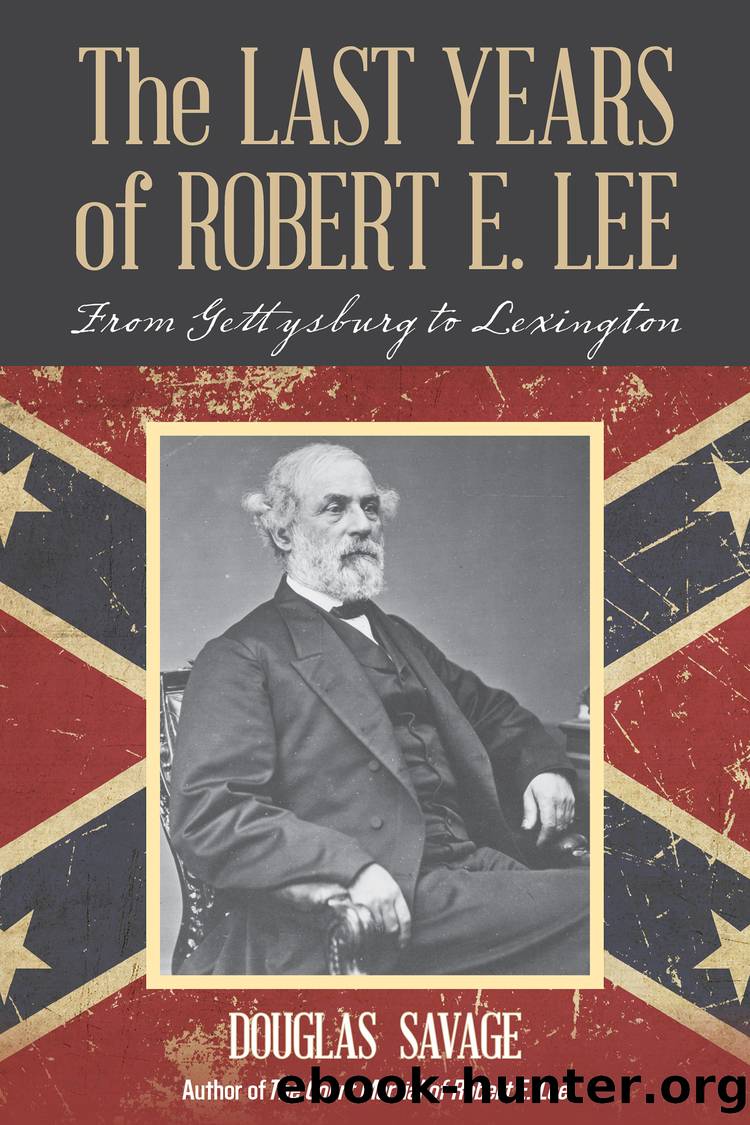The Last Years of Robert E. Lee by Savage Douglas;

Author:Savage, Douglas; [Savage, Douglas]
Language: eng
Format: epub
Publisher: Taylor Trade Publishing
Published: 2016-07-13T20:28:50+00:00
Seventeen
Friday night, April 7, Federal Major General Seth Williams (West Point, â42), forty-three, assistant adjutant general of the Army of the Potomac, delivered a note from Lieutenant General Grant. Williams had served on Robert Leeâs faculty during Lieutenant Colonel Leeâs superintendency at West Point. The note was passed through the lines to Billy Mahoneâs post. From General Mahone, the note dated 5:00 p.m. was relayed to General Lee in conference with James Longstreet at 9:30 p.m.
âThe results of the last week must convince you of the hopelessness of further resistance,â Lieutenant General Grant wrote. âI regard it as my duty to shift from myself the responsibility of any effusion of blood by asking of you the surrender of that portion of the C. S. Army known as the Army of Northern Virginia.â
General Lee grimly handed the note to âOld Peteâ Longstreet, who carefully read the message from his kinsman by marriage, U. S. Grant.
âWell?â the commanding general asked his âold warhorseâ of so many great and bitter campaigns.
âNot yetâ was all that Lieutenant General James Longstreet said.
So began the exchange of nine notes between the War Between the Statesâ greatest captains, and the last forty-six hours of the Army of Northern Virginia. Both Ulysses S. Grant and Robert E. Lee would spend the next two days laboring mightily to demonstrate that the true test of manhood is the extent to which one can remain a gentleman under unbearable stress.
Unknown to James Longstreet, General Lee sent a written answer to Grantâs note. âI have read your note of this date,â the white-bearded Virginian wrote. âThough not entertaining the opinion you express of the hopelessness of further resistance on the part of the Army of N. Va., I reciprocate your desire to avoid useless effusion of blood and, therefore, before considering your proposition, ask the terms you will offer on the condition of its surrender.â The Old Man used the dreadful word surrender, which he had forbidden his son Rooney Lee to use only two hours earlier.
In the literary convention of the day, General-in-Chief Lee signed his longhand notes with the affectation âVery respectfully, your obedient servant.â And Lieutenant General Grant signed his notes to Robert Lee, âVery respectfully.â
After sending off his note through the lines to Grant, General Lee ordered his troops awakened after their momentary nap in the evening twilight. The march must resume, or the old army would perish in the mud.
With Lee at Cumberland Church four miles north of Farmville, the wagon train was well ahead at New Store, twenty miles from Farmville. The army was only two wings: Old Pete still at the helm of First Corps, along with the remains of A. P. Hillâs Third Corps, and John Gordonâs Second Corps, combined with Dick Andersonâs stragglers from Fourth Corps. An hour before midnight, Friday night, Gordonâs command resumed the mud march westward to Lynchburg and its prayed-for food at the railroad hub. During the first minutes of Saturday, April 8, Lieutenant General Longstreet followed, with the exhausted cavalry bringing up the rear.
Download
This site does not store any files on its server. We only index and link to content provided by other sites. Please contact the content providers to delete copyright contents if any and email us, we'll remove relevant links or contents immediately.
In Cold Blood by Truman Capote(3374)
The Innovators: How a Group of Hackers, Geniuses, and Geeks Created the Digital Revolution by Walter Isaacson(3137)
Steve Jobs by Walter Isaacson(2888)
All the President's Men by Carl Bernstein & Bob Woodward(2362)
Lonely Planet New York City by Lonely Planet(2213)
And the Band Played On by Randy Shilts(2189)
The Room Where It Happened by John Bolton;(2150)
The Poisoner's Handbook by Deborah Blum(2131)
The Innovators by Walter Isaacson(2096)
The Murder of Marilyn Monroe by Jay Margolis(2093)
Lincoln by David Herbert Donald(1981)
A Colony in a Nation by Chris Hayes(1926)
Being George Washington by Beck Glenn(1904)
Under the Banner of Heaven: A Story of Violent Faith by Jon Krakauer(1788)
Amelia Earhart by Doris L. Rich(1685)
The Unsettlers by Mark Sundeen(1682)
Dirt by Bill Buford(1669)
Birdmen by Lawrence Goldstone(1660)
Zeitoun by Dave Eggers(1643)
